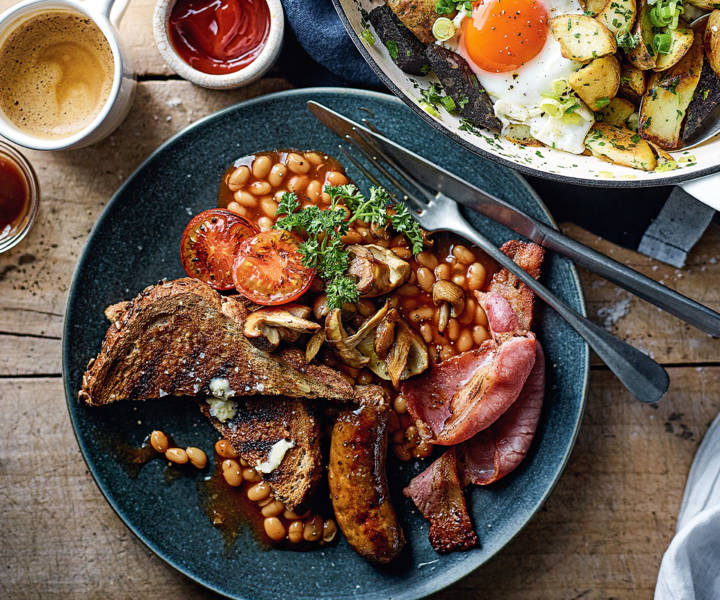Food
10 things that put the Great in The Great British Breakfast
by Neil Davey

Breakfast, according to many a mum, is the most important meal of the day. That point may be debatable, but it’s certainly one of the most loved meals of the day. Neil Davey takes a look at the most important elements of The Great British Breakfast
1. Porridge
Because… it’s healthy, filling and versatile
Never underestimate the mighty oat. Naturally gluten-free, wonderfully low on the glycaemic index, it ticks all sorts of dietary boxes and, as a relatively neutral flavour, is fantastically adaptable. Throw in some fruit for a nutritious healthy start, or cream for an indulgent one, or yogurt for the compromise. I’ve met Scots who swear by porridge mixed with water, others who add whisky (DEFINITELY no ‘e’ in this instance), but however you make it, it’s hard to go wrong.
2. Eggs
Because… the variety, the protein, the flexibility
Humble and self-contained, the egg is so much bigger than the sum of its parts. It stars in sauces – including the eggs Benedict-flavouring Hollandaise – in breakfast bakes, as well as on its own in various forms, directly on the plate. While the default egg is, of course, the hen’s egg, that doesn’t have to be the case. On Sainsbury’s shelves alone you can find Clarence Court duck eggs and quail’s eggs, not to mention multiple versions of hen’s eggs: Woodland Free Range, Organic, Burford Browns, Happy Eggs, even Respectful’s carbon-neutral eggs, which are reducing carbon emissions through innovative farming.
3. Bacon
Because… well, have you smelled it?
If it’s breakfast and there’s eggs, there should be bacon too, right? Well, unless it’s left out for religious / vegan / vegetarian reasons, of course (in which case you might want to skip ahead to the baked beans). According to Tim Finney, MD of Helen Browning’s Organic, there are various reasons why bacon is an enduring favourite, but you can probably guess the key one. ‘It’s the smell,’ says Tim. ‘When you smell bacon, your head turns. It’s a trigger.’
So what makes a good rasher? ‘With some bacon,’ Tim explains, ‘you cook it and it’s astonishing how much water comes out. So good bacon should be dry, and there should be fat – that’s where the flavour is. And fat makes meat cook better, keeps it moist.’
As for the perfect way to serve it? ‘Bring it up to room temperature first – I take it out of the fridge an hour before I cook it. Put it in an already hot pan and fry until it’s starting to crisp up. Put it onto some delicious homemade bread, without butter, but dip one side in the fat. Not fried, just sticky. Hmm, this is making me hungry…’
4. Sausage
Because… well, sausages
The sausage’s journey to the breakfast plate is mostly lost to the annals of history. The name derives from the latin ‘salsicus’ – meaning ‘seasoned with salt’ – and there’s some evidence to suggest sausages originated in the Middle East in the Bronze Age, before becoming popular with the Ancient Greeks and Romans. I mean, they’re sausages – of course they liked them, right?
While the word probably brings to mind something cylindrical made of pork from north of the border, it may also summon up something square made of beef, thanks to the delights of the Lorne sausage. While the square format comes from being shaped in a tin (and beef because, historically, it’s the more popular meat), the origins of the name are a little more obscure. Legend has it that Lorne sausage is named for Glaswegian comedian Tommy Lorne, but the sausage appears to predate his birth. The more likely explanation may be that it originates from Lorne, a now extinct region in Argyll and Bute.
5. Black pudding
Because… there’s a lot of history and flavour in a slice
According to Debbie Pierce, CEO of The Bury Black Pudding Company, black pudding originated in Europe and was brought to Lancashire by medieval monks. ‘They settled in and around Bury,’ explains Debbie, ‘and that’s why Bury is synonymous with black pudding.’ A company called Casewell’s is reported to have sold the town’s first black pudding in 1810. These days, The Bury Black Pudding Company is carrying that particular torch, going from strength to strength – ‘110 tonnes before Christmas’ – and keeping it beautifully local. ‘We’ve shaken off the “flat cap” image,’ says Debbie. ‘When we started, we had six staff. Now we have 112, and all local – families work here.’
6. White pudding
Because… you can’t have a traditional regional breakfast without it
According to many – but not all because, apparently, heated arguments are one of the best things about British breakfasts – white pudding is a key ingredient in the Ulster Fry or on the Full Scottish plate. But what is it? According to Colette Twomey, MD of Clonakilty Black Pudding – who also supply white pudding to Sainsbury’s – it’s basically black pudding without the blood. ‘Our white pudding is pork meat, pinhead oatmeal, minced onions, spices. It’s got good bite. The only extra ingredient in the black pudding is the blood.’ If black pudding leaves you feeling apprehensive, Colette suggests this is your ‘training’ pudding: ‘People often taste the white pudding first, and that launches them onto the black.’
Curiously, the traditional Cornish breakfast calls for something called hog’s pudding (or sometimes groat’s pudding), which basically seems to be white pudding by another name…
7. Baked beans
Because… they’ve been a British staple since the 1960s
We mentioned heated arguments above and – er, arguably – beans are the biggest dividers of opinion. In a brief Twitter poll on breakfasts, several talked of the fear of beans ‘contaminating’ other ingredients by touching them. One thing beans do show is how quickly the British breakfast can change. Every other ingredient has been around for years. Beans date back to 1895 – when Heinz invented them in the US – but only started appearing regularly on British breakfast plates in the 1960s and 1970s. The reason? The Beanz Meanz Heinz commercials and the power of suggestion.
8. Hash browns
Because… we like using up a leftover even more than we like breakfast carbs
Ok. We’re calling them hash browns in the heading but we’re going to shoehorn in all forms of breakfast potatoes, from American ‘home fries’ and / or ‘skillet potatoes’ to the good old British bubble and squeak. The latter, of course, as any pub quiz-goer / trivia lover knows, is named for the noises it makes when the ingredients – leftover potatoes and cabbage (plus anything else you fancy throwing in, really) – are fried. Hash – or hashed – browns originate in late 19th-century America, with the name referencing the French verb hacher, to chop. The dish then is chopped, fried potatoes – sometimes leftovers, sometimes made fresh. Their ever-growing popularity – even against the clearly superior bubble and squeak – appears to owe considerable debt to the McDonald’s breakfast menu.
9. The vegan alternative
Because… many of us are switching to a meat-free existence
‘There’s definitely a shift, a trend, towards plant-based,’ says Tom Lindley, head of vegetarian and vegan food company Cauldron. ‘Some are going vegan, some vegetarian, but many are just thinking that some days a week we should eat plants. I think it’s driven by three things: animal suffering, personal health and carbon footprint.’ Cauldron sausages – Lincolnshire and Cumberland – make excellent breakfast alternatives, though Tom also suggests scrambled tofu. ‘Seriously,’ he tells me, ‘I was sceptical too. But it’s better than scrambled egg.’ There’s another reason to choose Cauldron products, too: as of 1 January 2022, they’ve gone fully carbon neutral.
10. Dishoom’s bacon and egg naan
Because… breakfast is a moveable feast and Britain is multicultural
‘It’s not a super authentic breakfast,’ admits Dishoom co-founder Shamil Thakrar, ‘and I can’t tell you a complicated origin story of the dish, because there isn’t one!’ The dish in question is the bacon and egg naan, which has rapidly become a much-imitated cult classic and the biggest-selling breakfast dish at Dishoom, the nationwide restaurant group that’s a tribute to the classic Irani cafés of Bombay. ‘If you took one of these old cafés from Bombay and stuck it in the UK, what would they do? I think they would create a naan roll.’
‘We don’t do fusion much,’ explains Shamil. ‘Our dishes are really authentic but, as a person of Indian heritage in London who’s working in food, I think we have licence to do something that mixes up the two cultures. I have my favourite bacon sandwiches around London so… that was the starting point. I feel it captures the fun, the whimsicality of the two cultures.’













